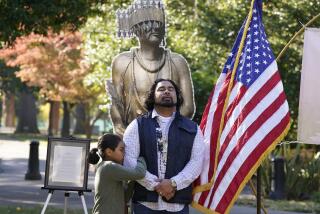Brazil’s Indians Win Tribal Land Rights
- Share via
RIO DE JANEIRO — Brazilian Indians have won new constitutional guarantees to thousands of square miles of territory, but preservation of those tribal lands is still far from assured, Indian rights advocates say.
“It is going to be a struggle,” predicted Ailton Krenak, a spokesman for the Union of Indigenous Nations.
The union, the umbrella group for Brazil’s 180 Indian tribes, led lobbying in the Brazilian Congress for the constitutional guarantees, which were approved June 1. The Congress is finishing a new national charter that will take effect this year.
The chapter on Indians gives tribes permanent possession of lands they have traditionally used, “including those indispensable for the preservation of environmental resources needed for their well-being and areas necessary for their physical and cultural reproduction, according to their usages, customs and traditions.”
By unofficial estimates, tribal territories cover 285,000 square miles, a total area larger than Texas.
Krenak said that half of the lands have already been cut by public highways or railroads. He said that 70% of the total is covered by outside claims on mineral resources, 39% is threatened by plans for hydroelectric dams and 29% has been invaded by gold prospectors.
“The worst invader of indigenous territory is the government,” he said.
But it is the government that will be responsible for setting boundaries of Indian reserves under the new constitution.
A transitory provision, still to be voted on, would give the government five years to fix the boundaries. The Union of Indigenous Nations opposes setting a deadline, Krenak said, because it fears that tribal lands will be lost in areas where boundaries have not been fixed when the deadline passes.
Most of Brazil’s 220,000 Indians live in the jungles of the Amazon Basin, a vast region under increasing development pressure. By the end of 1987, fewer than 50 of Brazil’s 518 known tribal areas had been legally set aside as reserves with defined boundaries.
Congressman Fabio Feldmann, who helped draft the constitutional chapter on Indian rights, said its passage was a victory for Indians. But, he added, the battle is not over: Many Brazilians contend that leaving large areas of Brazil’s interior wilderness to the Indians will impede national development.
“We need to struggle hard from now on, because interests in the indigenous territories are strong,” Feldmann said in a telephone interview from Brasilia.
The chapter says that hydraulic and mineral resources on Indian lands may be exploited only with congressional authorization after the affected Indian communities have been heard and assured a share of the proceeds.
Except in the case of national interest, as determined by law, all projects that would use or occupy Indian lands would be invalidated by the constitution. And for the first time, Indian organizations would be entitled to take legal action in their own interests.
The government Indian Foundation, known by the acronym Funai, is empowered by law to represent and protect Brazilian Indians. The Union of Indian Nations and other organizations have accused Funai of abusing its power, sometimes for the illicit gain of foundation officials. Funai has denied the accusations of corruption.
Eduardo Leao, an official of the Catholic Church’s Council of Indian Missions, said the new constitution will change the relationship between Indians and the government.
“The government will no longer be able to do things without consulting the Indian population and the Congress,” Leao said.
He said he hopes the new constitutional guarantees for tribal landholdings will help reduce conflicts between Indians and outsiders such as prospectors, ranchers and squatters. In one of the bloodiest recent incidents, 14 Tikuna Indians were killed March 28 in an attack by lumber workers on the Solimoes River, near the Colombia border.
More to Read
Sign up for Essential California
The most important California stories and recommendations in your inbox every morning.
You may occasionally receive promotional content from the Los Angeles Times.













